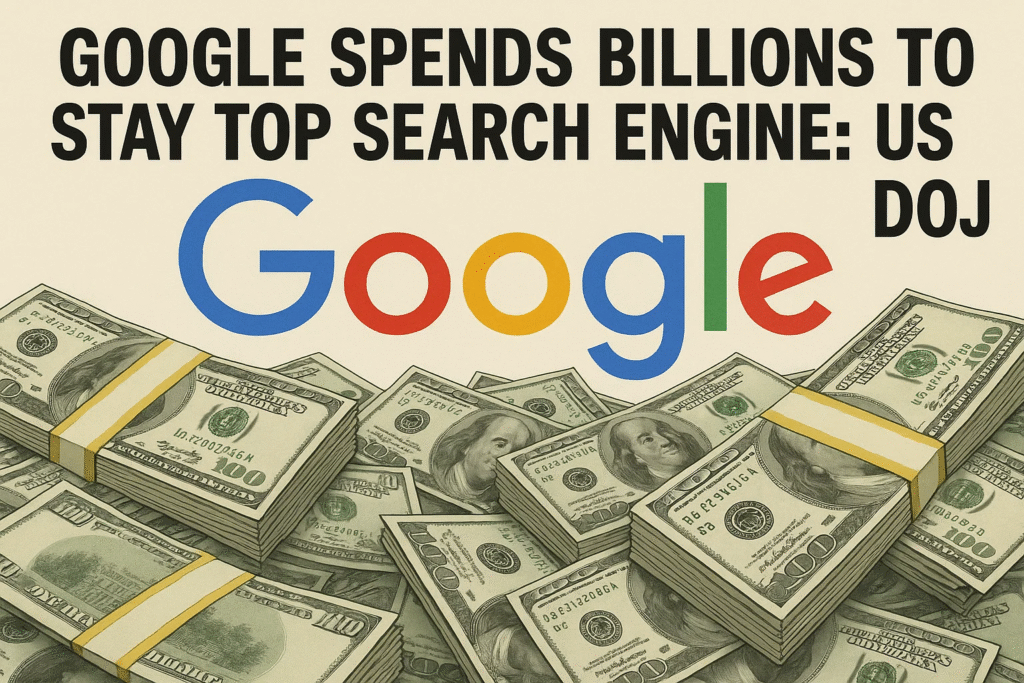Google — the name synonymous with “search” — is once again under scrutiny. While the company’s products dominate the web, a major U.S. Department of Justice (DOJ) case has revealed just how far Google allegedly goes to stay on top. According to the DOJ, Google spends billions of dollars every year to ensure it remains the default search engine on mobile phones, browsers, and other devices.
The lawsuit accuses Google of using exclusive contracts, revenue-sharing deals, and restrictive agreements that make it nearly impossible for competitors to get a fair chance. This case has become one of the most significant antitrust battles since the U.S. government took on Microsoft in the 1990s.
In this article, we’ll explore how Google’s business model works, what the DOJ is alleging, what evidence has surfaced, and how the case could reshape the future of search and technology itself.
The DOJ vs. Google Case — A Brief Background
The U.S. Department of Justice filed its antitrust lawsuit against Google in October 2020. The core argument was simple:
Google maintains its monopoly over the search and search advertising markets through illegal and exclusionary tactics.
The DOJ claims Google’s deals and payments with device makers, carriers, and browsers prevent fair competition and shut out rival search engines like Bing, DuckDuckGo, and Yahoo.
The case is seen as a test of how antitrust law can be applied to modern digital markets where data, not just dollars, determine dominance.
How Google Allegedly Maintains Its Search Monopoly
The DOJ argues that Google doesn’t just rely on its superior search algorithm. Instead, it pays massive sums to ensure that people never leave Google in the first place.
Here’s a breakdown of the alleged strategies:
| Tactic / Strategy | Description | Estimated Cost / Impact | Effect on Competition |
|---|---|---|---|
| Default Search Deals | Google pays device makers and browser developers (like Apple and Samsung) to make Google the default search option. | Over $20 billion per year reportedly spent on default contracts. | Rivals like Bing and DuckDuckGo rarely get exposure. |
| Exclusivity Clauses | Google’s contracts sometimes prevent partners from working with rival search engines. | Legal documents show exclusive terms across multiple devices and platforms. | Competitors are locked out of access to users. |
| Pre-installed Apps | Google ensures its apps (Chrome, Search, YouTube) are preloaded on Android phones. | Bundled by default on nearly every Android device. | Consumers are funneled to Google services automatically. |
| Revenue Sharing Agreements | Google shares ad revenue with companies who agree to keep Google as their default search engine. | Tens of billions paid annually in revenue-sharing incentives. | Competitors can’t match these massive payouts. |
| Data Scale Advantage | Google’s huge user base gives it unmatched data for improving algorithms. | Billions of daily searches refine Google’s machine learning systems. | Smaller search engines can’t compete with Google’s data-driven precision. |
Why Default Status Matters So Much
People rarely change their default search engine. Studies have shown that more than 85% of users stick with whatever search tool comes built into their device.
That’s why being the “default” on iPhones, Android devices, and browsers like Safari or Chrome is worth billions. It’s not just convenience — it’s control over how people access information.
The DOJ claims that Google’s multibillion-dollar payments to Apple, Samsung, and others are not competitive marketing — they’re a strategic wall to keep users from ever trying something else.
Evidence Presented in the Trial
The trial revealed a number of internal communications, contracts, and testimonies that shed light on Google’s business practices.
Here are some of the highlights:
-
Apple Deal: One of the biggest revelations was Google’s annual payment to Apple (estimated around $10–15 billion per year) to remain the default search engine on Safari.
-
Google’s Own Emails: Internal messages showed executives referring to default search placement as “extremely valuable real estate.”
-
“We pay to stay on top” admissions: The DOJ presented evidence that Google’s executives were fully aware that losing default status on major devices could cause a massive drop in search volume.
-
Destroyed Documents: The DOJ accused Google of deleting internal chats and records that could have served as key evidence — suggesting deliberate concealment.
-
Locked-Out Rivals: Smaller search engines testified that they struggled to gain even minimal traffic because Google’s deals with Apple and Android partners left no room for alternatives.
Legal Framework: What the Law Says
The DOJ’s case is built on Section 2 of the Sherman Antitrust Act, which prohibits monopolization or attempts to monopolize a market through exclusionary conduct.
To win, the DOJ must prove two main points:
-
Google holds monopoly power in the general search and search advertising markets.
-
Google maintains that monopoly through anticompetitive, exclusionary practices rather than superior products.
The court has already confirmed that Google holds more than 90% of the U.S. search market, making it a clear monopoly by traditional standards.
Google’s Defense
Google argues that:
-
Users choose Google freely because it provides the best results — not because it’s the default.
-
Default deals are normal business practice, similar to shelf placement in supermarkets or app stores.
-
Competitors have fair opportunities to compete — for example, Microsoft’s Bing is preinstalled on Windows computers.
-
Changing defaults is easy, and many users do it if they prefer another engine.
-
Regulation could hurt innovation, making the Internet less efficient and less user-friendly.
However, the DOJ counters that the scale and exclusivity of Google’s payments make them fundamentally different from ordinary business partnerships.
The Verdict and What Comes Next
After years of legal arguments, the U.S. court ruled in 2024 that Google violated antitrust laws by maintaining an illegal monopoly in search and search advertising.
The ruling did not immediately break up Google, but it set the stage for a second phase — deciding how to fix the monopoly.
Potential remedies discussed include:
-
Banning exclusive default contracts with device makers or browsers.
-
Allowing fair competition by offering users clear choice screens when setting up devices.
-
Requiring transparency in Google’s data and advertising deals.
-
Separating Chrome or parts of the advertising business from Google Search (a possibility under consideration).
As of 2025, the remedies phase is still ongoing. However, the judge has already indicated that Google can no longer sign exclusive contracts that make its search engine the only option on key platforms.
Impact on Consumers
For everyday users, this case might seem distant, but its outcome could shape the way we use the Internet for years to come.
Potential Benefits:
-
More choice: You could see new search engines offered by default on devices.
-
Improved privacy: Competitors like DuckDuckGo could gain visibility.
-
Innovation boost: Smaller tech companies could develop new ideas without being blocked by Google’s dominance.
Potential Risks:
-
User confusion: More options could make setup screens more complex.
-
Quality concerns: Rivals may not match Google’s accuracy or speed.
-
Disruption: If Google’s advertising model is affected, free services like Gmail or YouTube might face funding challenges.
Impact on the Tech Industry
The Google antitrust case is being watched closely by every major tech company.
-
Apple: Faces questions about its long-term deals with Google and whether they reduce competition.
-
Microsoft: Could benefit if Bing becomes a default option on more devices.
-
Privacy-focused startups: May get a fairer chance to reach users.
-
Advertisers and publishers: Could see changes in how digital ads are bought, priced, and displayed.
This ruling could set a new global precedent, influencing regulators in Europe, India, and other regions to take stronger action against digital monopolies.
Timeline of Major Events
| Year / Date | Key Event |
|---|---|
| 2020 | DOJ files antitrust lawsuit against Google. |
| 2021 | Discovery phase begins — thousands of internal documents revealed. |
| 2023 | Trial begins, focusing on default agreements and market control. |
| 2024 | Judge rules Google violated U.S. antitrust law. |
| 2025 | Remedies phase begins — possible structural changes discussed. |
What Makes This Case So Important
This case isn’t just about Google — it’s about how the Internet works.
When one company controls how billions of people find information, it holds incredible power — over news, shopping, advertising, and even politics.
The DOJ’s case raises a fundamental question:
Is Google’s dominance the result of being the best — or of preventing others from even competing?
The outcome will help determine how much control any one company should have over the digital economy.
What the Future Might Look Like
Here are three possible future scenarios depending on how the remedies are applied:
1. Limited Reform (Most Likely)
Google keeps its core businesses (Search, Chrome, Android), but is barred from exclusive contracts. Competitors gain more visibility through “choice screens” and user selection options.
2. Structural Breakup (Less Likely)
Google is forced to separate key business units — for example, spinning off Chrome or Android to ensure fair competition. This would be a major change but is difficult to implement.
3. Status Quo (Unlikely but Possible)
If appeals delay or overturn key findings, Google may continue operating much as it does now, with only minor behavioral changes.
Criticisms of the DOJ’s Approach
Not everyone agrees with the DOJ’s stance. Critics argue that:
-
The DOJ is punishing success, not misconduct.
-
Being a default is not illegal — users can still switch.
-
Aggressive regulation may stifle innovation in U.S. tech.
-
Google’s products genuinely outperform competitors.
-
Antitrust laws written in the early 1900s don’t fit digital markets well.
These arguments highlight the difficulty of applying old legal frameworks to fast-moving technology ecosystems.
Lessons from History
The Google case mirrors the Microsoft antitrust battle from the late 1990s, when Microsoft was accused of using Windows to crush browser competition.
Back then, the case opened the door for new innovators — including Google itself.
Now, history may be repeating: if the courts restrict Google’s dominance, a new generation of search and AI companies could emerge just as Google once did.
Conclusion
The U.S. Department of Justice’s antitrust case against Google marks a turning point in the history of the Internet.
For over two decades, Google’s search engine has been the undisputed gateway to the world’s information. But the DOJ has pulled back the curtain, showing that this dominance may come not only from superior technology but from an intricate web of billion-dollar deals that shut others out.
Whether you view Google as a brilliant innovator or a monopolistic gatekeeper, one thing is clear: the outcome of this case will define how the digital economy functions for the next generation.
If competition is restored, consumers might finally experience a truly open search market — one where innovation, not default contracts, decides who wins.


